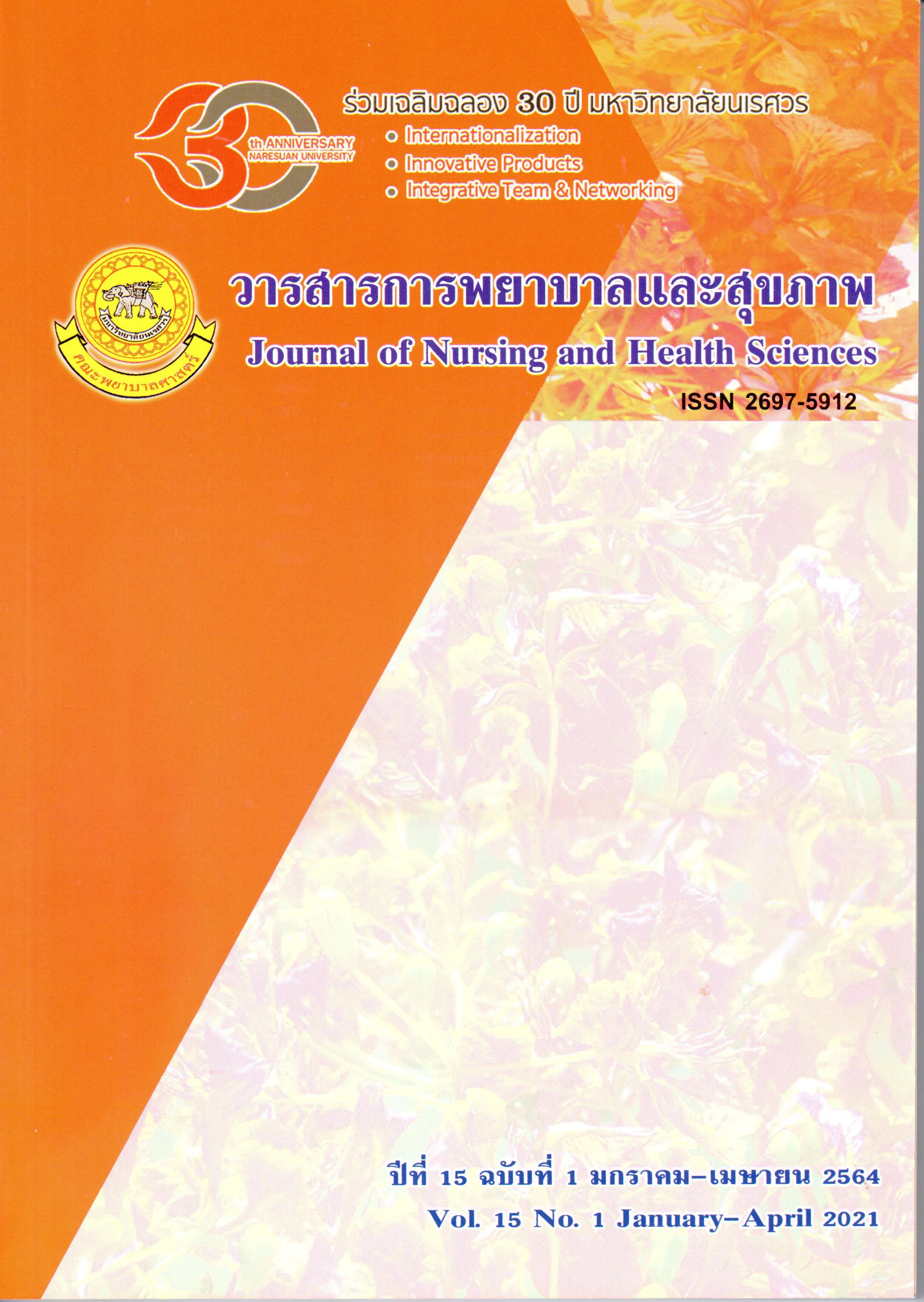ผลของการจัดการเรียนรู้ด้วยโปรแกรม Simulation ฉีดยา ต่อความพึงพอใจของนักศึกษาพยาบาลศาสตร์ชั้นปีที่ 2”
Main Article Content
บทคัดย่อ
งานวิจัยนี้เป็นงานวิจัยกึ่งทดลองแบบกลุ่มทดลองกลุ่มเดียววัดผลหลังการทดลอง มีวัตถุประสงค์ เพื่อศึกษาผลของการจัดการเรียนรู้ด้วยโปรแกรม Simulation ฉีดยา ต่อความพึงพอใจของนักศึกษาพยาบาลศาสตร์ชั้นปีที่ 2 จำนวน 72 คน ที่ลงทะเบียนเรียนวิชาปฏิบัติในห้องทดลองการพยาบาลพื้นฐาน เก็บรวบรวมข้อมูลด้วยแบบบันทึกข้อมูลส่วนบุคคลและแบบประเมินความพึงพอใจของการใช้งานโปรแกรม Simulation ฉีดยา มีลักษณะเป็นมาตราส่วนประเมินค่า 5 ระดับ นำแบบสอบถามมาหาความเชื่อมั่น ด้วยสัมประสิทธิ์แอลฟาของครอนบาค (Cronbach’s Alpha Coefficient) ได้ค่าความเชื่อมั่น = 0.94 สถิติที่ใช้ในการวิจัยคือ ค่าเฉลี่ย และส่วนเบี่ยงเบนมาตรฐาน ผลการวิจัยพบว่า ความพึงพอใจที่มีต่อการใช้งานโปรแกรม Simulation ฉีดยา จากนักศึกษาพยาบาลศาสตร์ชั้นปีที่ 2 อยู่ในระดับมาก (x̄ = 4.04, S.D.=1.43) ซึ่งแบ่งออกเป็น ด้านเนื้อหาตรงตามความต้องการของผู้ใช้โปรแกรม มีความพึงพอใจอยู่ ในระดับมาก (x̄ = 4.19, S.D.=0.93) ด้านความชัดเจนของสื่อตามตามฟังก์ชันงานของโปรแกรม มีความพึงพอใจอยู่ ในระดับมาก (x̄ = 3.99, S.D.=1.42) และด้านความง่ายต่อการใช้งานโปรแกรม มีความพึงพอใจอยู่ในระดับมาก (x̄ = 3.83, S.D.=0.66) ผลการศึกษาครั้งนี้แสดงให้เห็นว่าการเรียนการสอนในวิชาปฏิบัติการพยาบาลในห้องทดลองของนักศึกษาพยาบาลศาสตร์ในปัจจุบันควรมีการใช้เทคโนโลยีที่มีความเสมือนจริงเพื่อให้นักศึกษาได้การฝึกทักษะ ทบทวนหลักการที่ถูกต้อง ในห้องทดลอง ให้เกิดความมั่นใจ สามารถนำความรู้และทักษะที่ได้ไปใช้ในการฝึกปฏิบัติงานจริงเพื่อป้องกันเหตุการณ์ไม่พึงประสงค์ที่อาจเกิดขึ้นบนหอผู้ป่วย
Article Details

อนุญาตภายใต้เงื่อนไข Creative Commons Attribution-NonCommercial-NoDerivatives 4.0 International License.
เอกสารอ้างอิง
Bandura, A., & National Inst of Mental Health. (1986). Prentice-Hall series in social learning theory.
Social foundations of thought and action: A social cognitive theory. Englewood Cliffs, NJ, US:
Prentice-Hall, Inc.
Boonkerd, M., Mang-Ana, R. & Khrabuad, S. (2015). Effects of High-Fidelity Simulation Based Learning
on Self-Confidence and Nursing skill in Critical ill patient. Diversity in Health and Well-Being,
-993. [In Thai]
Davies, I.K. (1971). The Management of Learning. London. McGraw - Hill. 50-56.
Durham, C. F., & Alden, K. R. (2008). Enhancing Patient Safety in Nursing Education Through Patient
Simulation. In R. G. Hughes (Ed.), Patient Safety and Quality: An Evidence-Based Handbook for
Nurses. Agency for Healthcare Research and Quality (US).
Norkaeo, D. (2015). Simulation Based Learning for Nursing Education. Journal of Boromarajonani College
of Nursing, Bangkok, 31(3), 112-122. [In Thai]
Jungpanich, A. & Srisailaun, O. (2015). Effects of Using Daily Care Plan Video Teaching on Clinical Self-
Confidence and Satisfaction of Nursing Students, Kuakarun Faculty of Nursing,
Navamindradhiraj University. Kuakarun Journal of Nursing, 22(1), 17-34. [In Thai]
Kamanee, T. (2009). 14 Teaching. Method for Professional Teacher. 9th ed. Bangkok:
Chulalongkorn University Printing. [In Thai]
Luctkar-Flude, M., Wilson-Keates, B., & Larocque, M. (2012). Evaluating high-fidelity human simulators
and standardized patients in an undergraduate nursing health assessment course. Nurse Education
Today, 32(4), 448-452. doi:10.1016/j.nedt.2011.04.011
McAllister, M. et al. (2013). Snapshots of simulation: Creative strategies used by Australian educators to
enhance simulation learning experiences for nursing students. Nurse Education in Practice, 13(6),
-572. doi:https://doi.org/10.1016/j.nepr.2013.04.010
Neamsakul, W. (2013). The Development of Video Lesson on Leopole’s Maneuvers for Nursing
Students. The Conference on Innovation for Student Identify: Translation Knowledge in Practice.
Praboromarajchanok Institute, Ministry of Public Health. Bangkok Charansanitwong Printing,
-115. [In Thai]
Senadisai, S., & Prapaipanich, W. (2015). Fundamental nursing. Bangkok: Judthong. 416-461. [In Thai]
Sinthuchai, S., Ubolwan, K., & Boonsin, S. (2017). Effects of High-Fidelity Simulation Based Learning
on Knowledge, Satisfaction, and Self-Confidence among the Fourth Year Nursing Students
in Comprehensive Nursing Care Practicum. Ramathibodi Nursing Journal. 23(1), 113-27. [In Thai]
Sittipakorn, S. et al. (2018). Effects of High Fidelity Simulation Based Learning on Self-Confidence and
Satisfactions among the 3rd Years Nursing Student in Faculty of Nursing Mahasarakham
University. 14th Mahasarakham University Research Conference, 600-609. [In Thai]
Tantalanukul, S., Rattanasak, S., Sengpanich, C., Srisung., W. & Tungkawanich, T. (2016). The effect of
simulation-based learning on the ability development of primary medical care practicum of
nursing students at Boromarajonani College of Nursing Uttaradit. Boromarajonani College of
Nursing, Uttaradit Journal, 8(1), 49-58. [In Thai]
Waxman, K. T. (2010). The development of evidence-based clinical simulation scenarios: guidelines for
nurse educators. Journal of Nursing Education, 49(1), 29-35. doi:10.3928/01484834-20090916-07


